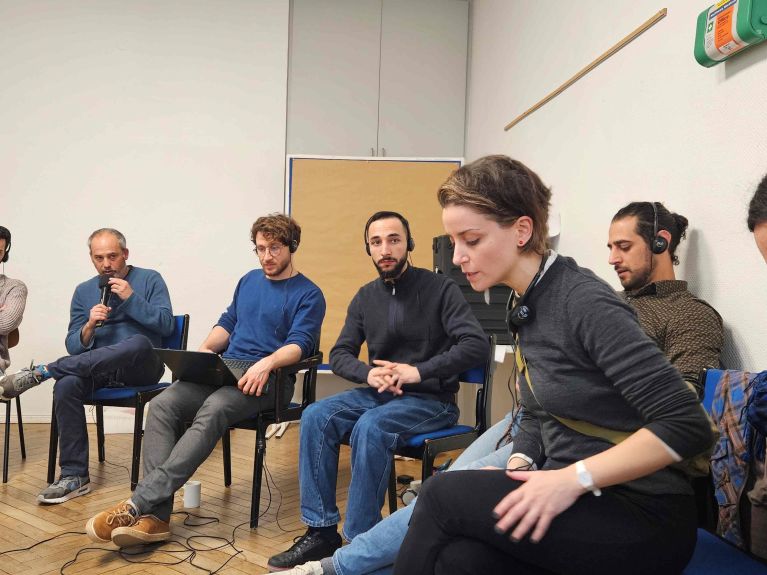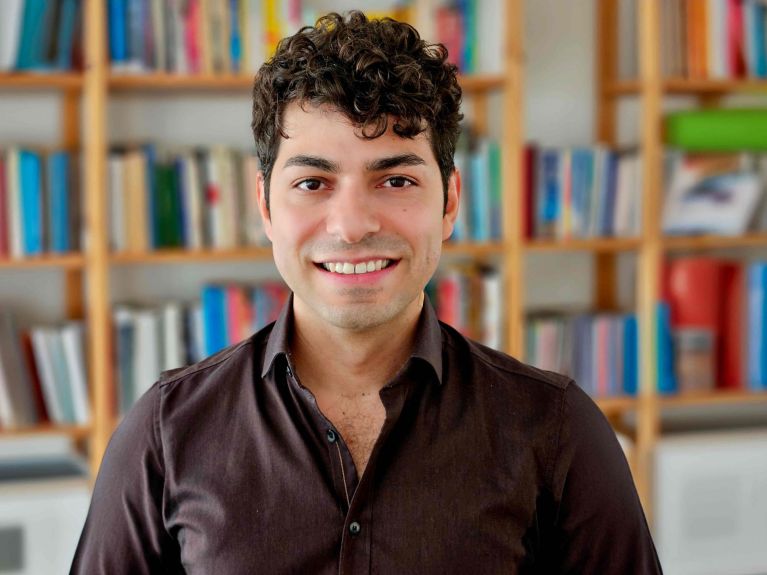“The dialogue is just the beginning”
From his home in Germany, Slieman Halabi is committed to getting Israelis and Palestinians talking to each other.

Slieman Halabi has lived in Germany since 2014. Before that, he lived in Israel as a Palestinian citizen. As a mediator and organiser of Israeli-Palestinian dialogue groups, he is committed to promoting dialogue between Palestinians and Israelis.
Mr Halabi, you haven’t been living in Israeli for some years now. Has this distanced you from what is happening in the region just now?
No, not in the least. I still feel close ties to the region and have also experienced wars in my home country - such as the Lebanon war in 2006. Shortly before I left Israel in 2014, Hamas missiles struck Tel Aviv for the first time. What is more, I still travel regularly to Israel. I am very upset by what is happening there at the moment.

You are an Arab Israeli of Druze faith and as such belong to a minority. Does that leave you somehow caught in the middle?
I would say that my identity is fairly complex. On the one hand, the Druze minority is very loyal to Israel for various historical reasons, and also does military service. Though I grew up as a Druze, I also identify as part of the Palestinian minority in Israel. Though that’s not a problem for me in principle, one is repeatedly called upon in the current situation to pick a side. Depending on who one is talking to, one is either on the right or the wrong side. The debate is completely toxic. I find this a great shame, as it destroys any democratic discourse.
You organise dialogue sessions between Israelis and Palestinians who live in Europe. How did this come about?
Even before the Hamas attack on Israel and Israel’s subsequent invasion of Gaza, I had already been planning to organise a dialogue. Such discussion groups have been taking place at the University of Tel Aviv’s psychological faculty for 20 years. They are initiated by the School for Peace. I myself was trained as a moderator at the School for Peace and have been chairing discussion groups in Israel since 2011. This is based on the firm belief that we can only resolve conflicts if we are able to talk to one another and discuss the difficult issues. And if we are willing to understand the other side’s perspective. That is precisely what the goal of our discussion groups is. It’s not a question of exchanging arguments, but of talking about our personal experiences. How do I experience the conflict and what is its significance for me?
We can only resolve conflicts if we are able to talk to one another and discuss the difficult issues.
What exactly is the School for Peace?
The School for Peace is part of a Peace Village in Israel in which Jews and Arabs live together. The village is located between Tel Aviv and Jerusalem. Since 1979, workshops and get-togethers have taken place there with the aim of fostering peace. Chaired dialogues are intended to help Jewish and Palestinian Israelis develop an understanding of one another and comprehend their own role in the conflict. Furthermore, dialogue moderators are trained who can then put the idea into practice elsewhere.
Is it easier to talk about the conflict between Israel and the Palestinians in Europe than in Israel?
I believe that anyone who has friends or family in Israel or Gaza will be very deeply affected by the current events. What is special about our dialogue is that we can bring Israeli Jews and Palestinians from all communities - be it from the diaspora or from Gaza - together here in Europe. That would not be possible in Israel.
The first dialogue meeting was planned as an online discussion - on 8 October of all days, that is to say one day after the brutal Hamas attack on Israeli civilians. How did you handle the situation?
We did of course wonder whether we should perhaps postpone the meeting given the circumstances. My feeling, however, was that we now needed to talk to each other more than ever. Otherwise we would go crazy. The others apparently felt much the same, as all 17 participants did indeed join the video call on 8 October.
Is it even possible for the dialogue participants to enter into any sort of exchange with one another in view of the violence on both sides?
We do frequently experience difficult moments. Sometimes there are accusations of blame or people launch into political discussions. However, we encourage the participants to tell their own stories. That fosters empathy. It is also helpful to sit together in a circle so that people can look directly into each other’s eyes. That also brings people closer. So far, however, we have only been able to organise one face-to-face meeting. Unfortunately, we lack the financial resources to stage further get-togethers.
Who are the people who take part in the meetings?
They are people from all kinds of different backgrounds. Most of them live in Germany, though a few live in France, the Netherlands, Switzerland, the United Kingdom or Spain. They are university graduates, programmers, people who work in marketing or for non-governmental organisations. Activists are also among them.
Many of them moved to Europe to escape the conflict with all its negative influences. As a result of the dialogue, however, they have realised that they cannot keep out of it.
What effect has the dialogue had on them?
The participants are changing. They are rethinking many of their attitudes. Many of them moved to Europe to escape the conflict with all its negative influences. This is particularly true of the Israelis in the group. As a result of the dialogue, however, they have realised that they cannot keep out of it. They are understanding that the issue will catch up with them wherever they are. At the same time, however, they are realising that they have the chance in Europe to make a stand for peace.
What does that mean in concrete terms?
Two participants, an Israeli woman and a Palestinian woman, have launched an aid project and are being supported by others from the group. Other initiatives are also being considered within the group. Before the dialogue began, most of the participants were convinced that they could do nothing to change the situation on the ground. As a result of the exchange, they no longer simply observe or discuss the problem but actually take concrete action. The dialogue is just the beginning.


